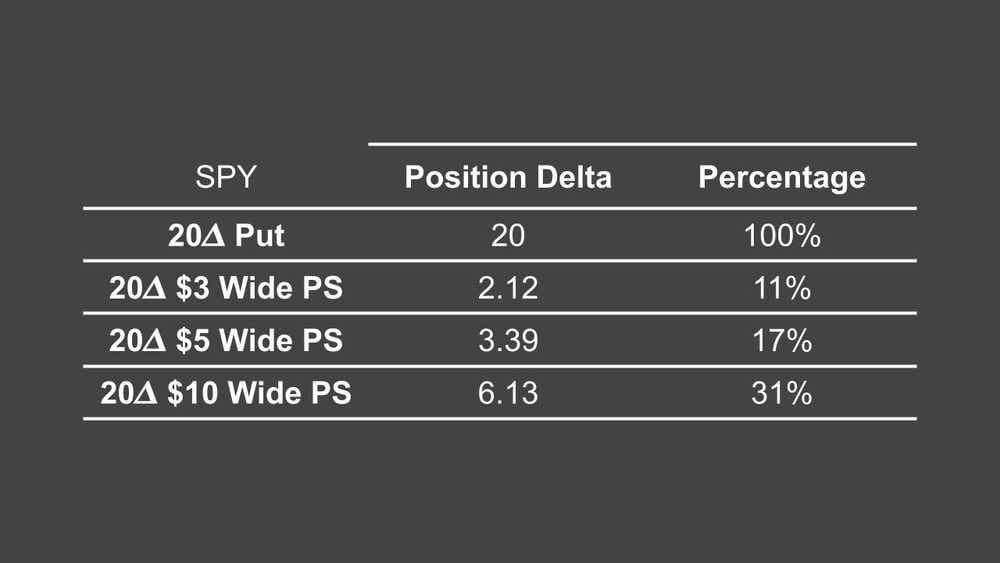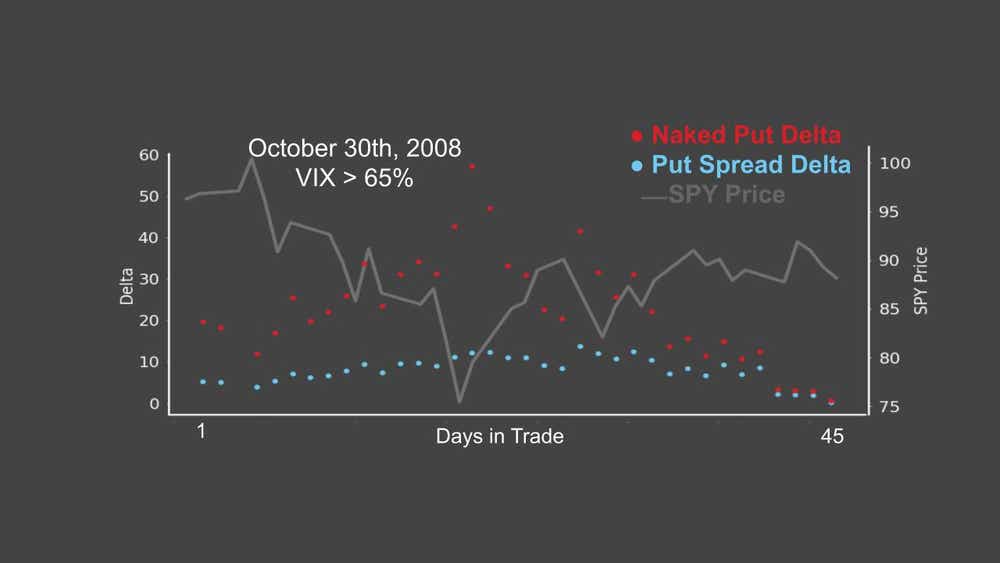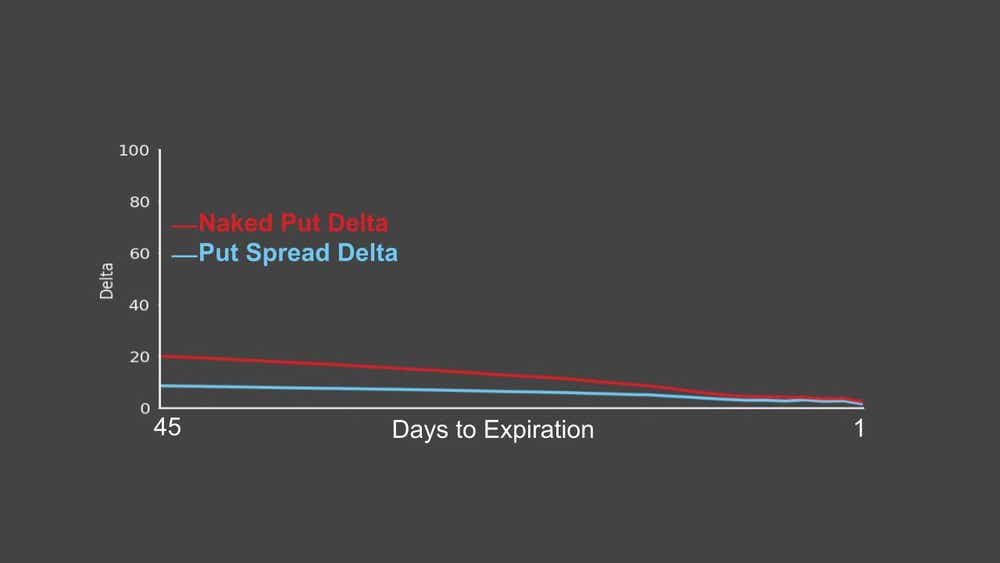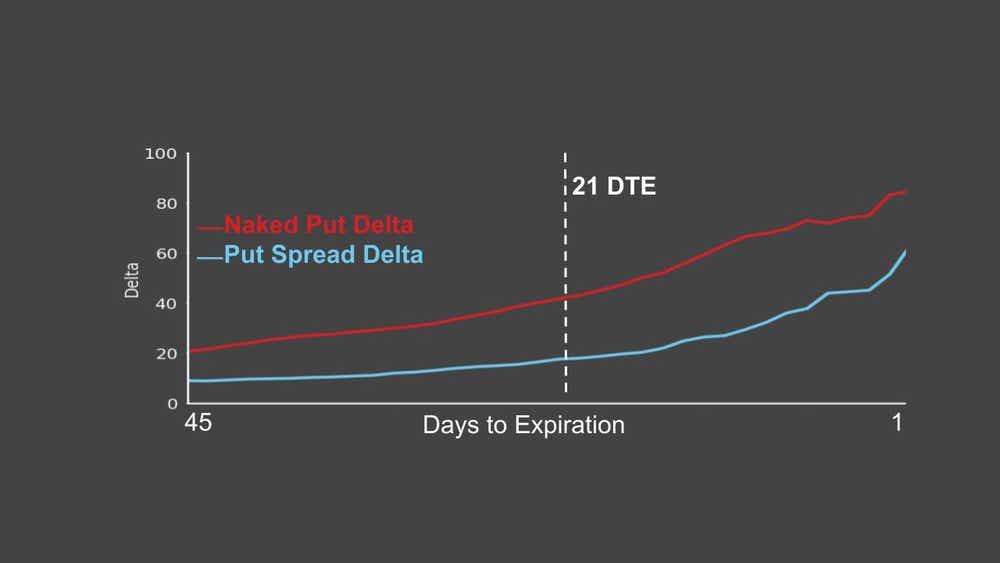Analyzing Directional Risk: Naked vs. Defined

Analyzing Directional Risk: Naked vs. Defined
By:Kai Zeng
Here’s how to manage delta with spread strategies, while improving stability with spread options
Switching from a risk-undefined (naked) option trade to a risk-defined strategy helps investors reduce the capital needed to maintain the position and decreases the maximum risk. Additionally, it diminishes directional risk, also known as delta. A smaller delta means the investment is affected less by changes in the stock price, resulting in slower profit or loss changes.
For instance, imagine selling a naked call option on Amazon (AMZN). If Amazon's stock price declines, you could face significant potential losses that are magnified by the delta value. However, converting this to a spread, such as a vertical spread, provides better control over delta exposure, reducing the impact of market volatility on your investment.
Naked options and spread strategies have different delta sensitivities. Generally, the tighter the spread, the lower the delta.

This difference becomes crucial when the market falls sharply and implied volatility (IV) increases quickly. In such scenarios, naked positions are more prone to delta expansion compared to spreads.
Consider the 2008 market crash as an example. During that period, naked positions showed a significant increase in delta, while spreads experienced less dramatic changes. This highlights the importance of using spreads to maintain more manageable delta levels, especially in volatile markets.

To understand how delta exposure changes over a standard 45-day trading cycle, compare risk-defined and undefined positions. A study that compared a 45-day, 20-delta put on the SPDR S&P 500 ETF Trust (SPY) with a 20-delta/$5 wide put spread found distinct patterns emerged.
In winning trades, the delta expansion and differences between these strategies were relatively small, as the positions were primarily out-of-the-money (OTM) when profitable.

However, in losing trades, naked puts showed quicker delta expansion than spreads. These in-the-money (ITM) positions represent higher risk if not proactively managed. Closing naked positions at 21 days to expiration (DTE) can significantly reduce directional risk by more than 50%.

Key Takeaways:
Small Delta Difference in Winning Trades: The delta exposure difference between risk undefined and defined options is minimal for winning positions.
Higher Risk in Losing Positions: Undefined positions, such as short puts, experience quicker delta expansion in losing trades, increasing risk more than spreads.
Proactive Management is Crucial: Actively managing undefined positions, such as closing them at 21 DTE, can greatly lower directional risk.
By understanding and using risk-defined strategies, investors can create more balanced and secure portfolios, effectively navigating market volatility.
Kai Zeng, director of the research team and head of Chinese content at tastylive, has 20 years of experience in markets and derivatives trading. He cohosts several live shows, including From Theory to Practice and Building Blocks. @kai_zeng1
For live daily programming, market news and commentary, visit tastylive or the YouTube channels tastylive (for options traders), and tastyliveTrending for stocks, futures, forex & macro.
Trade with a better broker, open a tastytrade account today. tastylive, Inc. and tastytrade, Inc. are separate but affiliated companies.
Options involve risk and are not suitable for all investors. Please read Characteristics and Risks of Standardized Options before deciding to invest in options.
tastylive content is created, produced, and provided solely by tastylive, Inc. (“tastylive”) and is for informational and educational purposes only. It is not, nor is it intended to be, trading or investment advice or a recommendation that any security, futures contract, digital asset, other product, transaction, or investment strategy is suitable for any person. Trading securities, futures products, and digital assets involve risk and may result in a loss greater than the original amount invested. tastylive, through its content, financial programming or otherwise, does not provide investment or financial advice or make investment recommendations. Investment information provided may not be appropriate for all investors and is provided without respect to individual investor financial sophistication, financial situation, investing time horizon or risk tolerance. tastylive is not in the business of transacting securities trades, nor does it direct client commodity accounts or give commodity trading advice tailored to any particular client’s situation or investment objectives. Supporting documentation for any claims (including claims made on behalf of options programs), comparisons, statistics, or other technical data, if applicable, will be supplied upon request. tastylive is not a licensed financial adviser, registered investment adviser, or a registered broker-dealer. Options, futures, and futures options are not suitable for all investors. Prior to trading securities, options, futures, or futures options, please read the applicable risk disclosures, including, but not limited to, the Characteristics and Risks of Standardized Options Disclosure and the Futures and Exchange-Traded Options Risk Disclosure found on tastytrade.com/disclosures.
tastytrade, Inc. ("tastytrade”) is a registered broker-dealer and member of FINRA, NFA, and SIPC. tastytrade was previously known as tastyworks, Inc. (“tastyworks”). tastytrade offers self-directed brokerage accounts to its customers. tastytrade does not give financial or trading advice, nor does it make investment recommendations. You alone are responsible for making your investment and trading decisions and for evaluating the merits and risks associated with the use of tastytrade’s systems, services or products. tastytrade is a wholly-owned subsidiary of tastylive, Inc.
tastytrade has entered into a Marketing Agreement with tastylive (“Marketing Agent”) whereby tastytrade pays compensation to Marketing Agent to recommend tastytrade’s brokerage services. The existence of this Marketing Agreement should not be deemed as an endorsement or recommendation of Marketing Agent by tastytrade. tastytrade and Marketing Agent are separate entities with their own products and services. tastylive is the parent company of tastytrade.
tastyfx, LLC (“tastyfx”) is a Commodity Futures Trading Commission (“CFTC”) registered Retail Foreign Exchange Dealer (RFED) and Introducing Broker (IB) and Forex Dealer Member (FDM) of the National Futures Association (“NFA”) (NFA ID 0509630). Leveraged trading in foreign currency or off-exchange products on margin carries significant risk and may not be suitable for all investors. We advise you to carefully consider whether trading is appropriate for you based on your personal circumstances as you may lose more than you invest.
tastycrypto is provided solely by tasty Software Solutions, LLC. tasty Software Solutions, LLC is a separate but affiliate company of tastylive, Inc. Neither tastylive nor any of its affiliates are responsible for the products or services provided by tasty Software Solutions, LLC. Cryptocurrency trading is not suitable for all investors due to the number of risks involved. The value of any cryptocurrency, including digital assets pegged to fiat currency, commodities, or any other asset, may go to zero.
© copyright 2013 - 2025 tastylive, Inc. All Rights Reserved. Applicable portions of the Terms of Use on tastylive.com apply. Reproduction, adaptation, distribution, public display, exhibition for profit, or storage in any electronic storage media in whole or in part is prohibited under penalty of law, provided that you may download tastylive’s podcasts as necessary to view for personal use. tastylive was previously known as tastytrade, Inc. tastylive is a trademark/servicemark owned by tastylive, Inc.